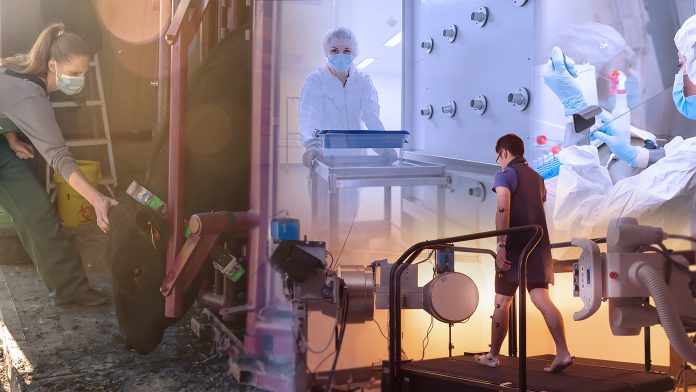The University of Calgary seeks partnerships to advance research through Horizon Europe Pillar II opportunities.
With an agreement in place between the EU and Canada, the University of Calgary (UCalgary) research community can now collaborate as a formal partner on Horizon Europe’s Pillar II opportunities addressing Global Challenges and European Industrial Competitiveness.
Located in the foothills of the Alberta Rocky Mountains, UCalgary is Canada’s youngest top ten research university. It has been the number one research-based startup creator in Canada for three years.
UCalgary currently has active educational and training agreements with 52 countries, including a campus in Qatar, and since 2018, has been a collaborator in over 2,900 completed and ongoing research and non-research agreements with international partners from 60 countries, including a Strategic Alliance with the University of Aberdeen in Scotland and Curtin University in Australia.
Dr William Ghali, Vice-President (Research), said: “The University of Calgary, as an international research hub, is excited about the prospective collaborations made possible by the agreement between the EU and Canada. We have a demonstrated track record of international research collaboration and partnerships contributing to global community impact.”
UCalgary’s unique facilities and drive to innovate and draw international partnerships
UCalgary has established itself globally as the world’s first United Nations University (UNU) Hub on Empowering Communities to Adapt Environmental Change in collaboration with the UNU Institute for Water, Environment and Health. In addition, UCalgary’s Centre for Health Informatics is a designated World Health Organization Family of International Classification Collaborating Centre.
UCalgary’s Arctic Institute of North America is home to the Kluane Lake Research Station, where the environmental and geographical attributes of the region and location provide unique research opportunities to support climatology, natural resources and environmental research. Meanwhile, the current development of Quantum City, an ecosystem of quantum science and technology in partnership with Mphasis and the Government of Alberta, is an exciting UCalgary initiative attracting global talent.
Dr Ghali said: “Horizon Europe opportunities present a promising avenue for our researchers to impact communities beyond Alberta. Our researchers bring entrepreneurial thinking, transdisciplinary scholarship, and access to unique research infrastructure to the table. We are eager to start something impactful through these potential partnerships and continue contributing to the global research landscape to make a real impact on our communities.”
Pre-clinical and clinical health research is enabled through UCalgary research infrastructure embedded within two hospital campuses and a singular health-care system in Alberta, allowing for the translation of findings from bench to bedside. UCalgary leads the REBX Exchange, a unique-in-Canada platform to simplify and expedite research ethics administration processes for multi-site clinical trials and non-health research studies between jurisdictions.
Examples of this work include the UCalgary-led ESCAPE international randomised clinical trial for stroke intervention, which involved research partnerships with 22 sites from North America, Europe, the UK, and Asia. Results found that a clot retrieval procedure, known as endovascular treatment, can dramatically improve patient outcomes after an acute ischemic stroke.
The current HEMO clinical trial for an implantable therapeutic to improve blood pressure regulation after spinal cord injury is led by UCalgary’s RESTORE Network in partnership with the Lausanne University Hospital in Switzerland and Dutch company ONWARD.
Leading-edge health research infrastructure unique to UCalgary includes the International Microbiome Centre, designed to investigate the microbiome of humans, plants, animals, and the physical environment. The Centre for Mobility and Joint Health features state-of-the-art imaging, movement assessment and diagnostic equipment, with some imaging equipment only available in this lab and one or two other facilities worldwide.
UCalgary scholars recognised internationally for their expertise in health, space, and energy
For the past two decades, UCalgary has been ranked a top institution globally in paediatric concussion research, with more than 30 experts focused on this area of research, including five Canada Research Chairs, and is ranked top-four for total publications and citations in concussions worldwide.
UCalgary’s is leading the One Health Consortium, a pan-collaborative transdisciplinary platform focused on antimicrobial use and resistance research, policy, training, outreach, and commercialisation. This research initiative is complemented by UCalgary’s W.A. Ranches, a working cow-calf ranch with 19,000 acres for cattle, farmland for feed production, and wildlife habitat provides a unique living lab for agriculture research and technology development, and Advancing Canadian Water Assets, a fully integrated, fully contained university research facility located within an operating industrial wastewater treatment plant.
In addition to vast expertise in health, UCalgary has long been a world leader in navigation and positioning technologies, with faculty regularly participating in international space missions, including the European Space Agency’s ROARS mission and the CASSIOPE satellite project, which was conceived, researched, and operated by UCalgary.
The Microsystems Hub at UCalgary is one of about 20 in Canada. This open-access facility provides a high-level cleanroom with CAD$8m in specialised equipment for micro- and nanofabrication, characterisation, and prototyping.
UCalgary is also a leader in developing the ground-breaking energy innovations the world urgently needs, with more than 300 UCalgary interdisciplinary scholars researching to transform the energy landscape for a cleaner, more efficient energy future. UCalgary is one of three universities leading the Canadian Government’s Energy Modelling Hub.
In the last six years, UCalgary researchers have published over 40,000 scientific articles, half of which are in collaboration with international researchers, and it is currently the academic home for 311 international postdoctoral scholars.
UCalgary is not just a local institution but a truly international university, deeply invested in the exchange of knowledge across borders. UCalgary is embracing its role as a prospective global partner for research advancement and industrial competitiveness.
Please note, this article will also appear in the seventeenth edition of our quarterly publication.





